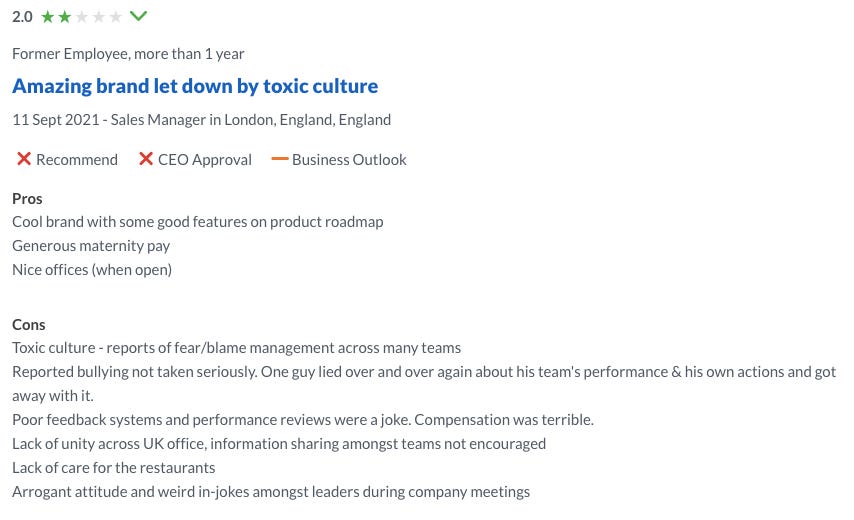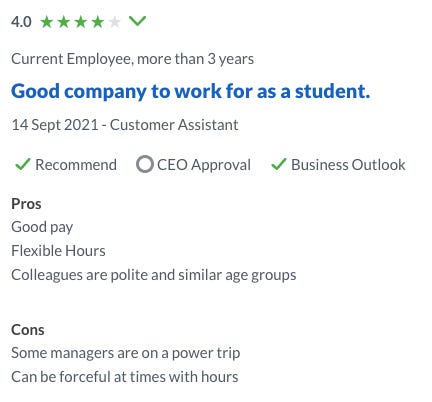Lawsuits, ethics and leveraging data
A chat with Glassdoor
Hi, Lucy Harley-McKeown here with the latest instalment of the New Power Review. Last time we looked at old unions doing new things, including the United Tech & Allied Workers and how Wetherspoons workers organised during the pandemic.
But unions aren’t the only way to shift power to the workers -- new online platforms also offer new opportunities.
This time we dig into what Glassdoor really does, the power of anonymity in calling out poor behaviour, and how it sees its own position in the labour market.
Get the latest from us on Twitter.
Glassdoor: Standing up for workers with the world’s largest collection of employee reviews
An employee at a tech giant says:
An employee at a media brand speaks up:
A cashier at a big supermarket chain says:
One of the cornerstones of capitalism is marketplace competition, an arena where you can act in your own interest. This is also a feature of the jobs market, with players such as Glassdoor leading the way in offering a porthole to suss out a company before committing to working for them.
Accessible employee reviews force employers to offer better conditions in order to attract workers. If the labour market is competitive, it will raise employee conditions everywhere.
A recent survey from marketing agency Fractl found that 84% of job seekers look at reviews when they’re on the hunt, and a third have turned down jobs in the face of negative press.
Glassdoor is a jobs board and review platform, where employees can review their experience of working at an organisation, providing details such as their salary, what they were asked at an interview and granular detail on what working for different teams in a company is like. Content is not always positive, and posts in the past have led to legal threats and a scramble to manage reputations.
Here, we chat to Joe Wiggins, corporate comms officer at Glassdoor and delve into the platform’s mission, its commitment to free speech and its resolve to protect employee interests.
This interview was edited for length and clarity.
Q: Tell me a bit about Glassdoor’s mission.
A: We aggregate user generated content, so salaries and interview breakdowns and company reviews. We've got about 95 million odd reviews and insights now across the world, on about 1.7 million companies.
Obviously, it's a two sided platform with current and former employees on one side and employers on the other side. And from the employer point of view, obviously, that's very important. That's where we generate revenue. From the company point of view, they can see it almost as a shop window for prospective employees.
Employers pay us to list jobs. Then there's brand advertising, opportunities in various different parts of the site. There are also enhanced branding tools to talk about why you're a great place to work. We are owned by Recruit, which is a Japanese holding company.
Q: Where does it sit in terms of unions in the working landscape?
A: At this point in 2021, where unions are perhaps less strong in certain industries, and with new types of companies springing up and new industries where there is no collective support or way of organising, Glassdoor definitely is a way for people to collectively give their authentic opinions on what's working on what's not working, and on what they're happy about and what they want to see change.
So, for example, gig workers, people that work on everything from delivery to the new sort of grocery delivery apps, there perhaps is no other way for them to collectively voice what they think. Glassdoor does play an important role in helping people to have a voice and helping people to feel that they can have an impact.
I guess unions would typically be bargaining for better conditions and better pay. That's what you can do by leveraging the power of Glassdoor. So in terms of pay, it's obvious. The more data points there are on Glassdoor, the more certain you can be about whether it’s correct. We indicate alongside any salary on Glassdoor, how confident we are in that depending on the data.
Q: What does Glassdoor stand for in terms of the employer-employee dynamic?
A: We stand for free speech — the anonymity aspect of Glassdoor is really important. And if it fills a gap, whereby there is no other way of collectively giving a voice kind of at scale, then data stores are a great kind of backup in the absence of something else.
Our place in this, although it wasn't necessarily a founding thought, is that it does plug a gap in the modern workplace, in terms of freedom of speech. We always protect the users and will, if required, go to court to protect people and to protect anonymity.
Obviously, companies do from time to time seek to unearth the identity of people who post reviews. And, we will always stand by our users and fight to protect their freedom of expression.
We're predominantly in the US and in the US courts. So we're governed by, by US law, which is obviously different in terms of freedom of speech to the UK or the EU. We do very much heavily support users. I think that speaks to the credibility of the content on site; the fact that you get the good, and the bad, and everything in between.
In terms of conditions, any organisation that has poor reviews consistently, over time and on consistent themes is going to find it very difficult to recruit. It's as simple as that, it really has got to the point now where that could be a deal breaker, and you might not even realise it.
Companies might not even realise because people aren't even in their pipeline, they're not even bothering to apply, as opposed to applying and then dropping out.
Q: Where is the line for what is considered acceptable content in terms of calling out an employer?
A: People use the platform to talk about everything from harassment to racism. All sorts of things could come out in a review. And we have very specific guidelines about what people can and can't say, so you can't talk about sensitive company information, you can't name individuals below the C-suite, or people that aren't public facing.
And we will block those reviews if that happens and give people the chance to edit them before it's posted. But I think it's about that kind of freedom of speech. And that freedom of expression is the gap that we feel and has important impacts to society, like with the gender pay gap, it's now much easier for women to find out what they should be paid and negotiate.
Q: Who does Glassdoor see as competition?
A: So obviously, we list jobs. And there are lots of companies that list jobs. We're the largest company worldwide in terms of the reviews and user generated content. But our sister company, Indeed [owned by the same entity], is the largest job site in the world.
There are plenty of other places where people can go and look for jobs in terms of that insight, and for people wanting to do their due diligence. There are other companies that have started to aggregate salaries in different areas and some of them focus on different niche areas.
I don't think there's any, any one organisation that has the breadth of data that Glassdoor has. Certainly not on a global scale. And it's really the scale that is important here, because the opinion of two, three or four people is useful, but the opinion of 30, 40, 50, 100 plus people starts to give you a really, really good trend.
Q: How do you use the data the organisation has collated?
A: As I said, we're sitting on a huge treasure trove of data. Obviously, employers can use their own data to look at trends, pull out themes and really get an understanding of employee sentiment. They can use it to look at what markets are going well, and what isn’t going so well to make a plan to address it.
We have an economic research team. So we have a chief economist on staff and a team of data scientists who look at the data for all sorts of things. We’ve looked at whether organisations with better culture and higher ratings perform better financially -- it turns out they do.
We also look at gender pay gaps and ethnicity pay gaps and advise companies on how to measure those.
Q: Would you say what Glassdoor does strays into consultancy?
A: We never go into the area of advising a company on how to fix something. There are plenty of agencies and consultancies which do that. But often those agencies and consultancies do use Glassdoor data, and increasingly, a lot of academics will be using Glassdoor data. There are lots and lots of academic papers written about workplace issues. Some of them are very, very niche, some of them are more broad.
MIT has produced a culture index using Glassdoor data, which is really interesting.
Another interesting development is investment banks and analysts using Glassdoor data from an environmental, social and corporate governance (ESG) point of view. So, they will write investment notes on sectors or specific listed companies, and heavily reference Glassdoor data as a way of looking inside the company. So, now you look at you have investors and shareholders potentially, and even VCs, looking at Glassdoor data.
Customers also use it to check whether what they’re using is ethical. From the point of view as a customer using a delivery app, you know, are you trading that convenience of getting a pint of milk or a loaf of bread within 10 minutes for any, any detriment on the employee side?
So now you have investors and consumers potentially looking at this data and making decisions that have nothing to do with where to work based on his data. So, would I buy from this company if I choose this energy supplier? Would I invest in his company based on how they treat people? Because workplace ethics is something that people are really into.
Q: What trends are you seeing on the platform right now?
A: We've seen an increasing focus on COVID and how companies have treated staff during the pandemic.
Locked down working, working from home, and flexible working, and all the issues that go with it have also come up. More often, from a positive point of view, but employees specifically calling out that their employer has looked after them during this past year and a half.
Whether it's tech support, whether it's clear internal communications, whether it's a senior management team that is approachable and easy to get hold of, whether it is managers that are agreeable to flexible working, whether it is new work from home policies, whatever it may be, we've seen a massive upswing in people talking about their work in relation to COVID.
And we've also seen an increasing focus on diversity. So I think with #MeToo, and then Black Lives Matter following quite soon after, there's been a big focus on what does the company stand for? And does it align with my values as an individual? That’s more so in the US, but definitely in the UK as well.
Q: What would Glassdoor count as a threat to the business?
A: There could be potential threats in terms of legislation around online platforms, and free speech and those sorts of things.
But I think that Glassdoor very much stands apart from social media platforms, which have a responsibility to be careful about what's posted and hate speech. We wouldn't put ourselves in that bucket. So there is the potential for legislation, which is well meaning in its intent to tackle those sorts of issues to have an inadvertent effect on something like Glassdoor.
What we’re reading
📚 Make Bosses Pay - Eve Livingston
🗞 LinkedIn may be the nerdiest social network, but its strategy is working -- FT (££)
🗞 Shunned by OnlyFans, sex workers are building their own alternatives -- Wired UK
ICYMI on Twitter




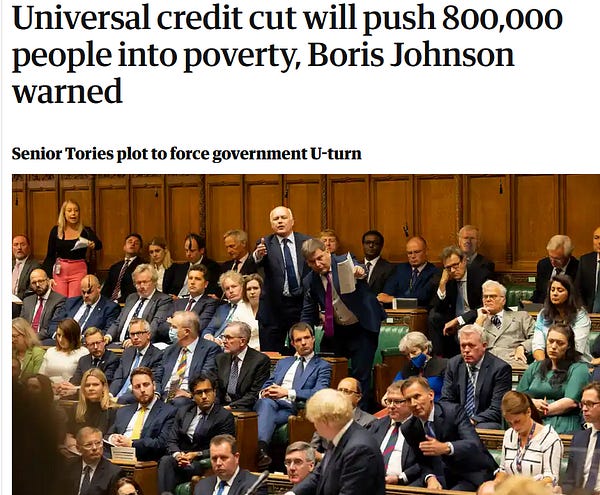
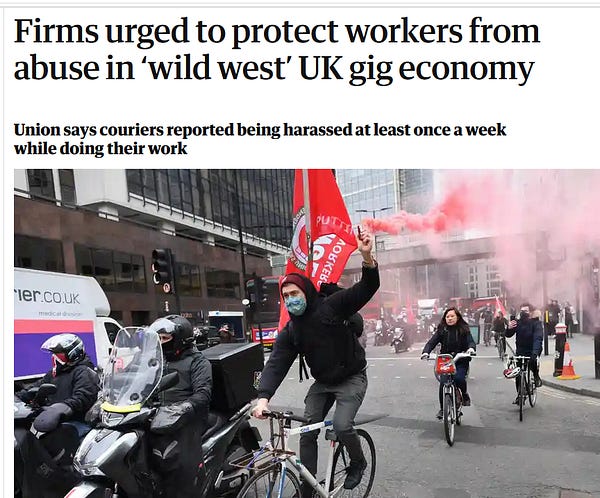
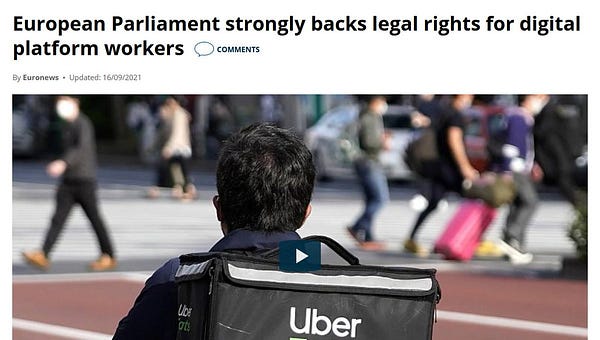
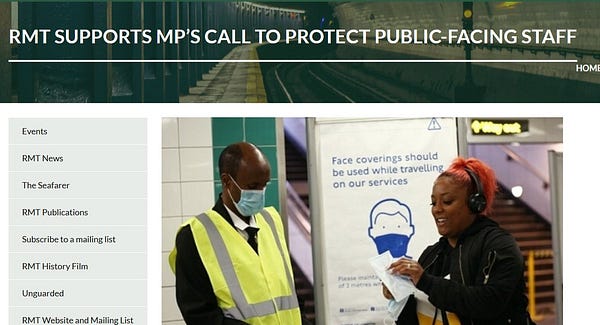
Thanks for reading, see you next time.

